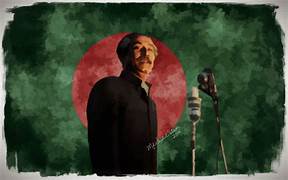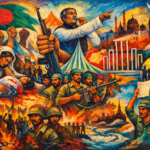A Tribute, A Homage, A Salute to Bangabandhu Sheikh Mujibur Rahman
A Black Dawn for the Bengali Nation
The morning of 15th August 1975 is etched into the darkest chapter of Bangladesh’s history. It was not just the assassination of a man. It was the brutal elimination of a dream, a vision, and a promise that had been written with the blood of three million martyrs and the tears of countless mothers, sisters, and daughters during the Liberation War of 1971.
On that fateful night and dawn, the conspirators struck with barbaric cruelty. Sheikh Mujibur Rahman, the Father of the Nation, the leader who gave voice to the voiceless, who resurrected the suppressed Bengali identity, was assassinated along with most of his family. His killing was not simply a political coup—it was an attempt to reverse the very essence of Bangladesh’s independence. It was designed to drag the country back into the clutches of those forces aligned with Pakistan, with their politics of hatred, religious extremism, and anti-Bengali chauvinism.
For Bengalis, 15th August is not just a day of mourning—it is a reminder of betrayal. It is a reminder of how fragile independence can be when conspiracies are hatched not only in foreign capitals but also within the corridors of one’s own armed forces and political elite.
Mujibur Rahman: The Architect of Bengali Nationhood
To pay homage to Sheikh Mujibur Rahman, one must first recall what he stood for and what he gave to the people of Bengal.
-
A Voice Against Exploitation: From the days of the United Front in 1954 to the Six-Point Demand in 1966, Mujib tirelessly fought against West Pakistan’s systematic economic exploitation and political marginalisation of East Pakistan. He made the Bengalis realise that they were not destined to be second-class citizens in their own land.
-
The Six Points as a Charter of Freedom: His historic Six Points became the Magna Carta of Bengali nationalism. Those who mocked it as separatism later recognised that it was the blueprint for Bangladesh’s independence.
-
The Election of 1970: Sheikh Mujibur Rahman won a clear mandate with 167 out of 169 East Pakistan seats in the National Assembly. It was the most decisive democratic verdict in South Asia’s history. Yet the Pakistani military junta refused to hand over power, choosing instead to unleash genocide on the night of 25th March 1971.
-
The Liberation War: Mujib was arrested and flown to West Pakistan. But the seeds he had sown sprouted into a people’s revolution. The Mukti Bahini, led by his loyal comrades, fought valiantly. India extended decisive support. On 16th December 1971, Bangladesh was born, and Sheikh Mujibur Rahman returned as the Father of a free nation.
-
The Dream of Sonar Bangla: Mujib envisioned a secular, democratic, and egalitarian Bangladesh. His struggle was not for power but for dignity—for the right of Bengalis to determine their own destiny.
For these reasons, he is rightly revered as Bangabandhu—Friend of Bengal. His presence in the 1970s was both symbolic and substantive: the glue that held together a traumatised, war-torn nation.
The Conspiracy and the Betrayal
Yet, within four years of independence, betrayal struck. The same reactionary forces who had collaborated with the Pakistan Army in 1971 regrouped. Elements within the military, encouraged by external powers, conspired against the Father of the Nation.
The killers were not acting alone. They represented a nexus:
-
Pakistani collaborators who could not forgive Mujib for breaking Pakistan.
-
Foreign intelligence services viewed Bangladesh’s secular and socialist orientation as a threat.
-
Domestic opportunists who sought to replace the Liberation legacy with their own brand of authoritarianism and Islamist politics.
Thus, in the early hours of 15th August 1975, Bangabandhu was gunned down inside his own home at Dhanmondi Road 32, along with his beloved wife, Sheikh Fazilatunnesa Mujib, his sons, Sheikh Kamal, Sheikh Jamal, and the 10-year-old Sheikh Russel, and many others of his family. Only his daughters—Sheikh Hasina and Sheikh Rehana—survived, being abroad at the time.
This was not merely an act of murder. It was a calculated regicide of a nation’s father.
The Aftermath: Darkness Descends
What followed was even more tragic.
The killers were rewarded, not punished. Successive regimes legalised their crime. General Ziaur Rahman, who rose to power in the chaos, rehabilitated war criminals, repealed secular provisions of the Constitution, and restored Jamaat-e-Islami, the very party that collaborated with the Pakistan Army in 1971.
Bangladesh began to slip back into the clutches of Pakistan’s ideology. The values of 1971—secularism, democracy, and equality—were systematically eroded. Instead, the politics of Islamism, military authoritarianism, and opportunism flourished.
For ordinary Bengalis, this was nothing short of a second betrayal. They had fought for freedom in 1971, only to see their independence hollowed out within a few years.
Remembering 15th August: A National Duty
Every year, 15th August must serve as a collective mirror for the people of Bangladesh. To pay homage to Bangabandhu is not only to weep for his loss but also to ask ourselves hard questions:
-
Have we remained true to his ideals?
-
Have we preserved the secular spirit of the Liberation War?
-
Have we ensured that never again shall collaborators of Pakistan dictate our politics?
The uncomfortable truth is that Bangladesh today faces another dangerous crossroad.
Today’s Crisis: Slipping Backwards
Nearly five decades after Mujib’s assassination, Bangladesh is again in turmoil. The warning signs are chillingly familiar:
-
Resurgence of Pro-Pakistan Forces: The very groups that opposed 1971—the Islamist hardliners, the anti-liberation elements—are once again emboldened. They thrive on misinformation, communal hatred, and revisionist history that seeks to undermine the Liberation War narrative.
-
Manipulated Student Movements: Just as student politics was hijacked in the 1970s, recent student uprisings have been infiltrated by forces that wish to erase Mujib’s legacy. What begins as a demand for reform is transformed into a dangerous attempt to delegitimise the Liberation War itself.
-
Foreign Intrigues: Regional powers, especially Pakistan, have not abandoned their dream of reasserting influence in Dhaka. The sudden alignment of certain political factions with Pakistan and even with radical groups is a red flag.
-
Erosion of Secularism: The constitutional commitment to secularism, once restored, is again under pressure. Fundamentalists are finding space in society, undermining Bangladesh’s identity as a pluralistic nation.
-
Disunity Among Liberation Forces: Those who once carried the torch of independence are fragmented. Opportunism, corruption, and partisan agendas have diluted the unity that defined 1971.
In this backdrop, the lessons of 15th August 1975 return with brutal urgency: When Bengalis forget their history, the enemies of independence strike back.
Saluting the Father of the Nation
On this solemn anniversary, it is essential to salute Sheikh Mujibur Rahman with humility and gratitude.
-
We salute him as the man who transformed the word “Bengali” from an ethnic identity into a national one.
-
We salute him as the leader who endured prison, conspiracy, and ridicule to awaken his people.
-
We salute him as the architect of independence who made Bangladesh a reality against impossible odds.
-
We salute him as the father whose blood nourished the soil of Bengal, reminding us that freedom has a price.
But a salute is not enough. Tribute must translate into responsibility. Mourning must evolve into vigilance.
The Duty of the Present Generation
Bangladesh’s youth today face a sacred duty: to guard the legacy of 1971 and 1975. This means:
-
Resisting Revisionism: Any attempt to downplay the genocide of 1971, or to rehabilitate collaborators, must be rejected outright. History cannot be rewritten by those who sided with Pakistan.
-
Defending Secularism: Bangladesh must remain a secular republic. Mujib believed in a land where Hindus, Muslims, Buddhists, and Christians could coexist as equals. That vision must not be surrendered to communal hatred.
-
Rejecting Violence: The politics of coups, assassinations, and street anarchy brought nothing but darkness. Bangladesh must resolve its conflicts through dialogue and democracy, not through bullets.
-
Upholding National Sovereignty: The Pakistani dream of reclaiming Dhaka must never be allowed to materialise. Bangladesh is a sovereign nation carved out through the supreme sacrifice of its people. No external power—be it Pakistan or any other—should dictate its path.
Conclusion: The Eternal Flame of Bangabandhu
The conspirators of 1975 thought that by killing Sheikh Mujibur Rahman, they could kill Bangladesh’s soul. They were wrong. His legacy continues to inspire millions. His words, his ideals, and his love for his people remain immortal.
Yet, legacies can fade if not guarded. Independence can be lost if not defended. 15th August 1975 was a warning that the enemies of liberation never sleep. And today, as Bangladesh faces growing instability, that warning echoes louder than ever.
Let us, therefore, turn this day of mourning into a day of resolve:
-
To remember the Father of the Nation with reverence.
-
To honour the martyrs of 1971 by safeguarding their dream.
-
To resist any attempt to drag Bangladesh back to the poisonous embrace of Pakistan.
On this black anniversary, let us bow our heads in grief, raise our fists in defiance, and renew our pledge:
“Bangabandhu Sheikh Mujibur Rahman, we salute you. Your Bengal will not be lost again. Your dream of Sonar Bangla will live on.”






